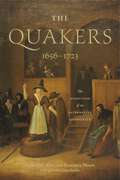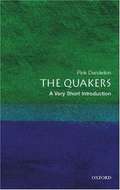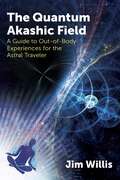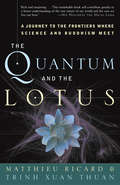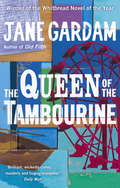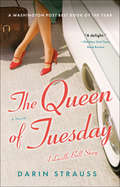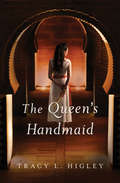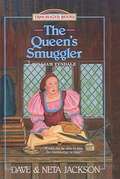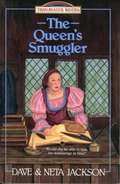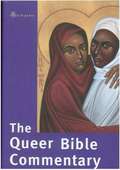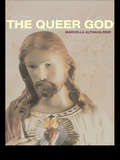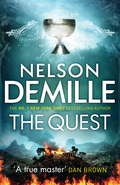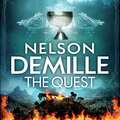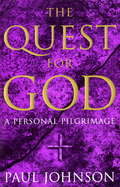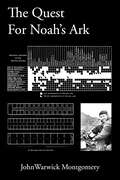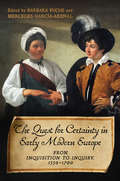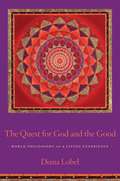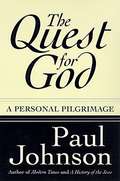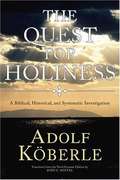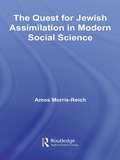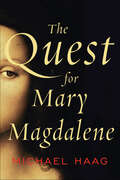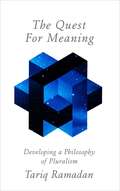- Table View
- List View
The Quakers, 1656–1723: The Evolution of an Alternative Community (The New History of Quakerism #2)
by Richard C. Allen Rosemary MooreThis landmark volume is the first in a century to examine the “Second Period” of Quakerism, a time when the Religious Society of Friends experienced upheavals in theology, authority and institutional structures, and political trajectories as a result of the persecution Quakers faced in the first decades of the movement’s existence. The authors and special contributors explore the early growth of Quakerism, assess important developments in Quaker faith and practice, and show how Friends coped with the challenges posed by external and internal threats in the final years of the Stuart age—not only in Europe and North America but also in locations such as the Caribbean. This groundbreaking collection sheds new light on a range of subjects, including the often tense relations between Quakers and the authorities, the role of female Friends during the Second Period, the effect of major industrial development on Quakerism, and comparisons between founder George Fox and the younger generation of Quakers, such as Robert Barclay, George Keith, and William Penn.Accessible, well-researched, and seamlessly comprehensive, The Quakers, 1656–1723 promises to reinvigorate a conversation largely ignored by scholarship over the last century and to become the definitive work on this important era in Quaker history.In addition to the authors, the contributors are Erin Bell, Raymond Brown, J. William Frost, Emma Lapsansky-Werner, Robynne Rogers Healey, Alan P. F. Sell, and George Southcombe.
The Quakers, 1656–1723: The Evolution of an Alternative Community (The New History of Quakerism)
by Richard C. Allen Rosemary MooreThis landmark volume is the first in a century to examine the “Second Period” of Quakerism, a time when the Religious Society of Friends experienced upheavals in theology, authority and institutional structures, and political trajectories as a result of the persecution Quakers faced in the first decades of the movement’s existence. The authors and special contributors explore the early growth of Quakerism, assess important developments in Quaker faith and practice, and show how Friends coped with the challenges posed by external and internal threats in the final years of the Stuart age—not only in Europe and North America but also in locations such as the Caribbean. This groundbreaking collection sheds new light on a range of subjects, including the often tense relations between Quakers and the authorities, the role of female Friends during the Second Period, the effect of major industrial development on Quakerism, and comparisons between founder George Fox and the younger generation of Quakers, such as Robert Barclay, George Keith, and William Penn.Accessible, well-researched, and seamlessly comprehensive, The Quakers, 1656–1723 promises to reinvigorate a conversation largely ignored by scholarship over the last century and to become the definitive work on this important era in Quaker history.In addition to the authors, the contributors are Erin Bell, Raymond Brown, J. William Frost, Emma Lapsansky-Werner, Robynne Rogers Healey, Alan P. F. Sell, and George Southcombe.
The Quakers: A Very Short Introduction
by Pink DandelionHere is the perfect introductory guide to the history and ideas of the Quakers, one of the world's most fascinating and enigmatic religious groups. Emerging in England in the 1650s as a radical sect challenging the status quo, the Quakers are now best known for their anti-slavery activities, their principled stance against war, and their pioneering work in penal reform. Famous Quakers include Thomas Paine, Walt Whitman, Lucretia Mott, Herbert Hoover, James Dean, Judi Dench, and A.S. Byatt. And while the group still maintains a distinctive worship method to achieve a direct encounter with God, which has been at the heart of the movement since its beginning, Quakers today are highly diverse: some practice a protestant evangelicalism, others are no longer Christian. In this generously illustrated book, Pink Dandelion, the leading expert on Quaker Studies, draws on the latest scholarship to chart the history of the sect and its present-day diversity around the world, exploring its unique approach to worship, belief, theology and language, and ecumenism. It concludes by placing the Quakers in the wider religious picture and predicting its future.
The Quantum Akashic Field: A Guide to Out-of-Body Experiences for the Astral Traveler
by Jim WillisA first-hand exploration of how to consciously step out of your body and navigate the Quantum Akashic Field • Details a step-by-step process of engaging extrasensory, out-of-body travel • Examines the quantum landscape of the Akashic Field, meetings with spirit guides, and descriptions of out-of-body experiences from the author&’s personal journal and from world spiritual traditions, including the Bible and the Baghavad Purana • Explores current theories about the science of consciousness and sensory perception, including discoveries from quantum physics, and how these discoveries align with the traditional wisdom of shamans, dowsers, and mystics Physicists have recently discovered a whole quantum-based reality, a multidimensional world where all potentials simultaneously exist. Called the Akashic Field by systems scientist Ervin Laszlo, it is the same quantum reality that mystics, shamans, and dowsers have been exploring for thousands of years through astral travel, spirit journeying, and energy work. Revealing how to gain awareness of the Quantum Akashic Field through conscious out-of-body experiences (OBEs), Jim Willis shares fascinating firsthand accounts taken from the detailed OBE journals he has kept for nearly 10 years, alongside analysis of recent discoveries in quantum physics and wisdom from the world&’s spiritual traditions. He details his own experiences with a wide variety of astral beings, spirit guides, landscapes, laws, and activities that he encountered in the Quantum Akashic Field. Drawing on scientifically-based principles that underlie the very nature of biological life, he explains how the brain is an organizer, not a producer, of consciousness. He explores the difference between dreams, visions, and OBEs and powerful ways to harness the imagination. Detailing a step-by-step process centered on safe, simple meditative techniques, Willis shows how to bypass the filters of your five senses while still fully awake and aware and engage in extrasensory, out-of-body travel. Sharing his journey to connect with universal consciousness and navigate the quantum landscape of the Akashic Field, he reveals how conscious OBEs allow you to penetrate beyond normal waking perception into the realm of quantum perception.
The Quantum and the Lotus: A Journey to the Frontiers Where Science and Buddhism Meet
by Matthieu Ricard Trinh Xuan ThuanMatthieu Ricard trained as a molecular biologist, working in the lab of a Nobel prize—winning scientist, but when he read some Buddhist philosophy, he became drawn to Buddhism. Eventually he left his life in science to study with Tibetan teachers, and he is now a Buddhist monk and translator for the Dalai Lama, living in the Shechen monastery near Kathmandu in Nepal. Trinh Thuan was born into a Buddhist family in Vietnam but became intrigued by the explosion of discoveries in astronomy during the 1960s. He made his way to the prestigious California Institute of Technology to study with some of the biggest names in the field and is now an acclaimed astrophysicist and specialist on how the galaxies formed. When Matthieu Ricard and Trinh Thuan met at an academic conference in the summer of 1997, they began discussing the many remarkable connections between the teachings of Buddhism and the findings of recent science. That conversation grew into an astonishing correspondence exploring a series of fascinating questions. Did the universe have a beginning? Or is our universe one in a series of infinite universes with no end and no beginning? Is the concept of a beginning of time fundamentally flawed? Might our perception of time in fact be an illusion, a phenomenon created in our brains that has no ultimate reality? Is the stunning fine-tuning of the universe, which has produced just the right conditions for life to evolve, a sign that a “principle of creation” is at work in our world? If such a principle of creation undergirds the workings of the universe, what does that tell us about whether or not there is a divine Creator? How does the radical interpretation of reality offered by quantum physics conform to and yet differ from the Buddhist conception of reality? What is consciousness and how did it evolve? Can consciousness exist apart from a brain generating it? The stimulating journey of discovery the authors traveled in their discussions is re-created beautifully inThe Quantum and the Lotus, written in the style of a lively dialogue between friends. Both the fundamental teachings of Buddhism and the discoveries of contemporary science are introduced with great clarity, and the reader will be profoundly impressed by the many correspondences between the two streams of thought and revelation. Through the course of their dialogue, the authors reach a remarkable meeting of minds, ultimately offering a vital new understanding of the many ways in which science and Buddhism confirm and complement each other and of the ways in which, as Matthieu Ricard writes, “knowledge of our spirits and knowledge of the world are mutually enlightening and empowering. ” From the Hardcover edition.
The Queen Of The Tambourine
by Jane GardamEliza Peabody is one of those dangerously blameless women who believes she has God in her pocket. She is too enthusiastic; she talks too much. Her concern for the welfare of her wealthySouth London neighbours extends to ingenuous well-meaning notes of unsolicited adviceunder the door.It is just such a one-sided correspondence that heralds Eliza's undoing. Did her letter have something to do with the woman's abrupt disappearance ? Why will no-one else speak of her? And why the watchful, pitying looks and embarassment that now greet her?
The Queen Of The Tambourine
by Jane GardamEliza Peabody is one of those dangerously blameless women who believes she has God in her pocket. She is too enthusiastic; she talks too much. Her concern for the welfare of her wealthySouth London neighbours extends to ingenuous well-meaning notes of unsolicited adviceunder the door.It is just such a one-sided correspondence that heralds Eliza's undoing. Did her letter have something to do with the woman's abrupt disappearance ? Why will no-one else speak of her? And why the watchful, pitying looks and embarassment that now greet her?
The Queen of Tuesday: A Lucille Ball Story
by Darin StraussLucille Ball, Hollywood&’s first true media mogul, stars in this &“bold&” (The Boston Globe), &“boisterous novel&” (The New Yorker) with a thrilling love story at its heart—from the award-winning, bestselling author of Chang & Eng and Half a LifeA WASHINGTON POST BEST BOOK OF THE YEAR • &“A gorgeous, Technicolor take on America in the middle of the twentieth century.&”—Colson Whitehead, Pulitzer Prize–winning author of The Nickel BoysThis indelible romance begins with a daring conceit—that the author&’s grandfather may have had an affair with Lucille Ball. Strauss offers a fresh view of a celebrity America loved more than any other. Lucille Ball—the most powerful woman in the history of Hollywood—was part of America&’s first high-profile interracial marriage. She owned more movie sets than did any movie studio. She more or less single-handedly created the modern TV business. And yet Lucille&’s off-camera life was in disarray. While acting out a happy marriage for millions, she suffered in private. Her partner couldn&’t stay faithful. She struggled to balance her fame with the demands of being a mother, a creative genius, an entrepreneur, and, most of all, a symbol.The Queen of Tuesday—Strauss&’s follow-up to Half a Life, winner of the National Book Critics Circle Award—mixes fact and fiction, memoir and novel, to imagine the provocative story of a woman we thought we knew.
The Queen's Handmaid
by Tracy HigleyA jealous Egyptian queen. A lascivious Galilean governor. A beautiful servant girl. Theirs is a story of prophecy, self-discovery, and revelation. The year is 39 BC. All of Alexandria awaits the arrival of Herod, the Galilean governor with his eye on the Judean kingship. The handmaid of Cleopatra, Queen of Egypt, receives a troubling visit from her aging mentor. An orphan since birth, Lydia lives in the palace at the demand of Cleopatra and her royal child, the son of Julius Caesar. But Lydia has a growing problem on her hands: her beauty is becoming a liability to the aging queen, and the visiting Herod's undisguised interest only makes matters worse. When Lydia's mentor is murdered, the handmaid inherits a daunting task. An ancient set of sealed scrolls, the secret writings of the prophet Daniel, must be returned to Jerusalem--before those who killed her mentor destroy the scrolls as well. The future of the Israelites depends on it. So Lydia leaves the palace to serve as lady's maid to Herod's wife in the Holy City. As Lydia is absorbed into the machinations of Herod's household, her mission-- and her people's hope of a Messianic King--are endangered at every turn. Can Lydia avoid the adulterous intentions of Herod? Can she deliver the scrolls to the mysterious man on the steps of the Temple? Will the true King of Israel ever rise? "Higley amazes us with another of her action-packed feats of storytelling." --RT Book Reviews, 4 1/2 Stars, TOP PICK! (on Palace of Darkness)
The Queen's Handmaid
by Tracy L. HigleyA jealousEgyptian queen. A lascivious Galilean governor. A beautiful servant girl. Theirs isa story of prophecy, self-discovery, and revelation.The year is 39 BC. All of Alexandriaawaits the arrival of Herod, the Galilean governor with his eye on the Judeankingship. The handmaid of Cleopatra, Queen of Egypt, receives a troubling visitfrom her aging mentor.An orphan since birth, Lydia lives in thepalace at the demand of Cleopatra and her royal child, the son of JuliusCaesar. But Lydia has a growing problem on her hands: her beauty is becoming aliability to the aging queen, and the visiting Herod's undisguised interestonly makes matters worse.When Lydia's mentor is murdered, thehandmaid inherits a daunting task. An ancient set of sealed scrolls, the secretwritings of the prophet Daniel, must be returned to Jerusalem--before those whokilled her mentor destroy the scrolls as well. The future of the Israelitesdepends on it. So Lydia leaves the palace to serve as lady's maid to Herod's wifein the Holy City.As Lydia is absorbed into themachinations of Herod's household, her mission-- and her people's hope of aMessianic King--are endangered at every turn. Can Lydia avoid the adulterousintentions of Herod? Can she deliver the scrolls to the mysterious man on thesteps of the Temple? Will the true King of Israel ever rise? "Higley amazes us with another of heraction-packed feats of storytelling." --RT Book Reviews, 4 1/2 Stars, TOP PICK! (on Palace of Darkness)
The Queen's Smuggler
by Dave Jackson Neta JacksonA Trailblazer Book. Sarah's father invites William Tyndale into their home for hiding and protection as he works on translating the Bible into English.
The Queen's Smuggler: William Tyndale (Trailblazer Books #2)
by Dave Jackson Neta JacksonThrilling adventure stories introducing young readers (ages 8-12) to Christian heroes of the past. The Queen's Smuggler. Sarah Poyntz is the daughter of an English merchant who operates a shipping business from Antwerp, Belgium, in 1535. Her father is very interested in the ideas of William Tyndale, who has fled England as a condemned outlaw for refusing to stop his translation work of the English Bible. Tyndale believes that the Word of God should be read by the common people in their own language, a belief shared by the Poyntz family. But when Tyndale is captured and imprisoned, Sarah becomes the only hope for saving his life. If she can successfully smuggle a copy of Tyndale's New Testament into the hands of the king's wife, Queen Anne, perhaps she can persuade him to spare Tyndale's life. If Sarah's desperate mission fails, her family is in peril of their lives. WILL SHE HAVE THE COURAGE TO GO THROUGH WITH IT? CAN TYNDALE'S LIFE BE SPARED?
The Queer Bible Commentary
by Deryn Guest Mona West Thomas Bohache Robert E. GossThis book brings together the work of several scholars and pastors known for their interest in the areas of gender, sexuality and Biblical studies. <p><p> Rather than a verse-by-verse analysis, typical of more traditional commentaries, contributors to this volume focus specifically upon those portions of the book that have particular relevance for readers interested in lesbian, gay, bisexual and transgender issues such as the construction of gender and sexuality, the reification of heterosexuality, the question of lesbian and gay ancestry within the Bible, the transgendered voices of the prophets, the use of the Bible in contemporary political, socio-economic and religious spheres and the impact upon lesbian, gay, bisexual and transgender communities. <p><p> Accordingly, the commentary raises new questions and re-directs more traditional questions in fresh and innovative ways, offering new angles of approach. This comprehensive, cutting-edge commentary is prefaced by an introductory essay by Professor Mary Tolbert. Contributors draw on feminist, queer, deconstructionist, utopian theories, the social sciences and historical-critical discourses. The focus is both how reading from lesbian, gay, bisexual and/or transgender perspectives affect the reading and interpretation of biblical texts and how biblical texts have and do affect lesbian, gay, bisexual and/or transgender communities. <p><p> The commentary includes an extensive bibliography that directs the reader to a full range of literature relating to queer interpretation of scripture.
The Queer God
by Marcella Althaus-ReidThere are those who go to gay bars and salsa clubs with rosaries in their pockets, and who make camp chapels of their living rooms. Others enter churches with love letters hidden in their bags, because their need for God and their need for love refuse to fit into different compartments. But what goodness and righteousness can prevail if you are in love with someone whom you are ecclesiastically not supposed to love? Where is God in a salsa bar?The Queer God introduces a new theology from the margins of sexual deviance and economic exclusion. Its chapters on Bisexual Theology, Sadean holiness, gay worship in Brazil and Queer sainthood mark the search for a different face of God - the Queer God who challenges the oppressive powers of heterosexual orthodoxy, whiteness and global capitalism. Inspired by the transgressive spaces of Latin American spirituality, where the experiences of slum children merge with Queer interpretations of grace and holiness, The Queer God seeks to liberate God from the closet of traditional Christian thought, and to embrace God's part in the lives of gays, lesbians and the poor.Only a theology that dares to be radical can show us the presence of God in our times. The Queer God creates a concept of holiness that overcomes sexual and colonial prejudices and shows how Queer Theology is ultimately the search for God's own deliverance. Using Liberation Theology and Queer Theory, it exposes the sexual roots that underlie all theology, and takes the search for God to new depths of social and sexual exclusion.
The Quest
by Nelson DeMilleMankind's greatest mystery lies in wait...Civil war rages in Ethiopia. A priest waits to die in a parched prison cell; he has not seen daylight for four decades. But then a mortar shell hits the compound, and the prisoner and his secret are free.Two reporters and a beautiful photographer save this wounded man, who tells them something too incredible to believe: the location of the Holy Grail. Thus begins an impossible quest that will pit them against murderous tribes, deadly assassins, fanatical monks, and ultimately, themselves. The Quest is a breakneck search for an ancient legend amid a dangerous jungle war - and no one's coming out unscathed.
The Quest
by Nelson DeMilleMankind's greatest mystery lies in wait...Civil war rages in Ethiopia. A man waits to die in a parched prison cell; he has seen daylight for four decades. But then a bomb hit hits the compound, and the prisoner and his secret are free.Two reporters, a beautiful photographer and a mercenary soldier save this wounded man, who tells them something too incredible to believe: the location of the Holy Grail. Thus begins an impossible quest that will pit them against murderous tribes, deadly assassins, fanatical monks, and ultimately, themselves. The Quest is a breakneck search for an ancient legend amid a dangerous jungle war - and no one's coming out unscathed
The Quest For God
by Paul JohnsonA leading historian examines his faith in God, in the light of the historical evidence and his own personal experiences.
The Quest For Noah's Ark
by John Warwick MontgomeryIn this compelling volume, renowned scholar John Warwick Montgomery presents a meticulously curated collection of accounts documenting sightings of Noah’s Ark and expeditions to Mount Ararat from antiquity to the modern era. Not merely for library research, these sources informed Dr. Montgomery's own journeys to Mount Ararat, which he summited in 1970. Drawing on historical sources, eyewitness testimonies, and rare archival materials, The Quest for Noah's Ark offers a rich tapestry of evidence surrounding one of the Bible’s most famous events. Complete with detailed maps, photographs, and artistic renderings, this work serves both the historian and the Christian apologist. Organized into thematic sections—from the biblical account of the Flood to modern-day quests fueled by “Ark Fever”—this book provides a scholarly yet accessible exploration of a subject that continues to fascinate and inspire. This is an indispensable resource for anyone interested in biblical archaeology, historical theology, or the enduring legacy of the Genesis narrative.
The Quest for Certainty in Early Modern Europe: From Inquisition to Inquiry, 1550-1700 (UCLA Clark Memorial Library Series)
by Barbara Fuchs Mercedes García-ArenalThis interdisciplinary collection explores how the early modern pursuit of knowledge in very different spheres – from Inquisitional investigations to biblical polemics to popular healing – was conditioned by a shared desire for certainty, and how epistemological crises produced by the religious upheavals of early modern Europe were also linked to the development of new scientific methods. Questions of representation became newly fraught as the production of knowledge increasingly challenged established orthodoxies. The volume focuses on the social and institutional dimensions of inquiry in light of political and cultural challenges, while also foregrounding the Hispanic world, which has often been left out of histories of scepticism and modernity. Featuring essays by historians and literary scholars from Europe and the United States, The Quest for Certainty in Early Modern Europe reconstructs the complexity of early modern epistemological debates across the disciplines, in a variety of cultural, social, and intellectual locales.
The Quest for God and the Good: World Philosophy as a Living Experience
by Diana LobelDiana Lobel takes readers on a journey across Eastern and Western philosophical and religious traditions to discover a beauty and purpose at the heart of reality that makes life worth living. Guided by the ideas of ancient thinkers and the insight of the philosophical historian Pierre Hadot, The Quest for God and the Good treats philosophy not as an abstract, theoretical discipline, but as a living experience. For centuries, human beings have struggled to know why we are here, whether a higher being or dimension exists, and whether our existence is fundamentally good. Above all, we want to know whether the search for God and the good will bring happiness. Following in the path of the ancient philosophers, Lobel directly connects conceptions of God or an Absolute with notions of the good, illuminating diverse classical texts and thinkers. She explores the Bible and the work of Plato, Aristotle, Augustine, Maimonides, al-Farabi, and al-Ghazali. She reads the Tao Te Ching, I Ching, Bhagavad Gita, and Upanishads, as well as the texts of Theravada, Mahayana, and Zen Buddhism, and traces the repercussions of these works in the modern thought of Alfred North Whitehead, Iris Murdoch, Alasdair MacIntyre, and Charles Taylor. While each of these texts and thinkers sets forth a distinct and unique vision, all maintain that human beings find fulfillment in their contact with beauty and purpose. Rather than arriving at one universal definition of God or the good, Lobel demonstrates the aesthetic value of multiple visions presented by many thinkers across cultures. The Quest for God and the Good sets forth a path of investigation and discovery culminating in intellectual and spiritual communion.
The Quest for God: A Personal Pilgrimage
by Paul JohnsonIn this probing, challenging and personal account of his feelings about God and religion, Paul Johnson shares with others the strength and comfort of his own faith. Informed by his great knowledge of history, The Quest for God is written with force, lucidity and eloquence by the author of Intellectuals, Modern Times, A History of the Jews and other works.
The Quest for Holiness: A Biblical, Historical and Systematic Investigation
by Adolf Koberle John C. MattesAdolf Koberle's 'The Quest for Holiness' is a significant contribution to world religious literature and a work of abiding value. As such it well deserves translation into the English language and widespread distribution among English language readers. Although written by a profound scholar, this book is not merely for theologians but for all who desire a sound, scriptural setting forth of the truths and the implications for each individual embodied in the steps of justification and sanctification. For simplicity, clarity, and completeness on this subject, this book is unsurpassed. It is written not merely with ink but with the lifeblood of the true believer striving daily for greater holiness and God-pleasing perfection.
The Quest for Jewish Assimilation in Modern Social Science (Routledge Studies in Social and Political Thought #Vol. 54)
by Amos Morris-ReichThe transformation of the human sciences into the social sciences in the third part of the 19th century was closely related to attempts to develop and implement methods for dealing with social tensions and the rationalization of society. This book studies the connections between academic disciplines and notions of Jewish assimilation and integration and demonstrates that the quest for Jewish assimilation is linked to and built into the conceptual foundations of modern social science disciplines. Focusing on two influential "assimilated" Jewish authors—anthropologist Franz Boas and sociologist Georg Simmel—this study shows that epistemological considerations underlie the authors’ respective evaluations of the Jews’ assimilation in German and American societies as a form of "group extinction" or as a form of "social identity." This conceptual model gives a new "key" to understanding pivotal issues in recent Jewish history and in the history of the social sciences.
The Quest for Mary Magdalene
by Michael HaagFrom the international bestselling author of The Templars and The Tragedy of the Templars comes a fascinating account of one of the most mysterious and controversial figures in religious history.Mary Magdalene is a larger figure than any text, larger than the Bible or the Church; she has taken on a life of her own. She has been portrayed as a penitent whore, a wealthy woman, Christ’s wife, an adulteress, a symbol of the frailty of women, and an object of veneration. And, to this day, she remains a potent and mysterious figure.In the manner of a quest, this book follows Mary Magdalene through the centuries, explores how she has been reinterpreted for every age, and examines what she herself reveals about woman and man and the divine. It seeks the real Mary Magdalene in the New Testament and in the gnostic gospels, where she is extolled as the chief disciple of Christ. It investigates how and why the Church recast her as a fallen woman, traces her story through the Renaissance when she became a goddess of beauty and love, and looks at Mary Magdalene as the feminist icon she has become today.
The Quest for Meaning: Developing a Philosophy of Pluralism
by Tariq RamadanIn The Quest for Meaning, Tariq Ramadan, philosopher and Islamic scholar, invites the reader to join him on a journey to the deep ocean of religious, secular, and indigenous spiritual traditions to explore the most pressing contemporary issues. Along the way, Ramadan interrogates the concepts that frame current debates including: faith and reason, emotions and spirituality, tradition and modernity, freedom, equality, universality, and civilization. He acknowledges the greatest flashpoints and attempts to bridge divergent paths to a common ground between these religious and intellectual traditions. He calls urgently for a deep and meaningful dialogue that leads us to go beyond tolerant co-existence to mutual respect and enrichment. Written in a both direct and meditative style this is an important, timely and intelligent book that aims to direct and shape debate around the most important questions of our time.
